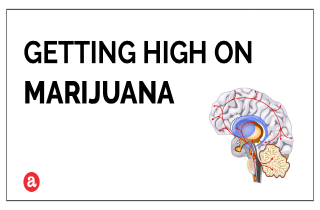Yes, you can get high on marijuana.
More here on weed’s psychoactive ingredients, how it works in the brain, and its addictive potential. Then, we invite your questions or comments about getting high on marijuana at the end.
What’s in marijuana? Psychoactive ingredients of marijuana
Marijuana refers to the dried leaves, flowers, stems, and seeds from the hemp plant “Cannabis Sativa”, which contains the psychoactive (mind-altering) chemical delta-9-tetrahydrocannabinol (THC), as well as other related compounds. This plant material can also be concentrated in a resin called hashish or a sticky black liquid called hash oil. But how does marijuana affect the nervous system?
Marijuana and central nervous system effects
When marijuana is smoked, THC rapidly passes from the lungs into the bloodstream, which carries the chemical to the brain and other organs throughout the body. While it takes only a minute or two to trigger effects when smoked, THC is absorbed more slowly when ingested in food or drink. But how does it work in the brain?
THC acts on specific molecular targets on brain cells, called cannabinoid receptors. These receptors are ordinarily activated by chemicals similar to THC that naturally occur in the body and are part of a neural communication network called the endocannabinoid system. This system plays an important role in normal brain development and function. Many of these receptors in parts of the brain that control memory, thought, concentration, time and depth perception, and coordinated movement. By activating these receptors, THC interferes with their normal functioning.
Marijuana, euphoria, and euphoric effect
Euphoria is a frequently reported effect from using marijuana. This effects is chemical in nature and results in a feeling or state of intense excitement and happiness. Other effects, which vary dramatically among different users, include:
- altered perception of time
- decreased inhibition
- heightened sensory perception
- ncreased appetite
- laughter
After a while (about 4-6 hours after smoking, or longer after oral ingestion), the effects of euphoria subside, and the user may feel sleepy or depressed. Occasionally, marijuana use may produce anxiety, fear, distrust, or panic.
Getting high on marijuana
Some people feel nothing at all when they smoke marijuana. Others may feel relaxed. Still others feel incredibly high. Many effects can depend on marijuana strain, dosage, or individual factors. For example, some users suffer bad effects from marijuana. What happens when you overdose on marijuana? Users may experience sudden feelings of anxiety and have paranoid thoughts. Hallucinations are also possible. However, these severe types of adverse side effects are more likely to happen when a more potent variety of marijuana is used.
When do people get addicted to marijuana?
Contrary to common belief, marijuana is addictive. Estimates from research suggest that about 9-10 % of users become addicted to marijuana; this number increases among those who start young (to about 17%, or 1 in 6 of those who use under age 18) and among people who use marijuana daily (to 25-50%). In addition to physical symptoms of drug dependence, you can also become psychologically addicted to marijuana after using it for a while. This is more likely to happen to people who use marijuana every day, or who started using it when they were teenagers.
Am I addicted to marijuana?
It can be difficult to acknowledge or identify problems with marijuana use. The first symptom of possible addiction is tolerance. When an individual smokes marijuana, at first it may only take a few puffs and he or she will feel the effects. After a couple of times of using the drug, it will take more and more in order to feel those same effects.
If you begin to experience symptoms of marijuana withdrawal when you don’t smoke pot, such as insomnia, anxiety or a loss of appetite, then there’s a very good chance that drug dependence has already set in. However, tolerance and dependence alone do not signal that you are addicted to marijuana.
When you use marijuana to cope with psycho-emotional issues, you can be addicted to it. Marijuana use as a means of escaping reality is a sure sign of addiction. If you feel like you have to smoke pot in order to cope with work, school, home or your family, addiction is likely an issue in your life. Drugs should never be used as a method of escaping reality or to cover up what is really going on. Instead, new coping mechanisms can help you live a productive and drug free life.
Questions about marijuana
Do you have problem with marijuana addiction? If you`re interested in finding more about marijuana effects, please ask us your question(s) directly at the bottom of the page. Hopefully, we can respond to you and help as soon as possible. Otherwise, we’ll refer you to someone who can.









Related Posts